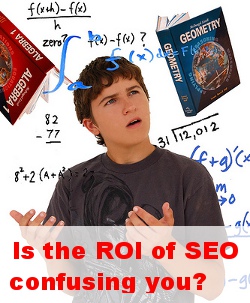
I share a lot of information about marketing topics and SEO (search engine optimization), but I realize that many people still wonder if SEO is real or just make believe. I have a pretty good idea of why this is the case, and I will share that with you. It is usually due to a history of low return on investment (ROI) for their SEO efforts, or a fear of low ROI for future SEO efforts. This pretty well covers it in basic terms.
Let’s face it, if you knew that you could hand a dollar to the search engine optimizer and they would hand you three dollars back, you would go to great lengths to get your hands on more dollars … to hand over to the SEO. So, what in this world would ever hold you back from that? I will venture an experienced guess. It is mostly a concern of whether you can actually see a return on investment, right? You want to know there is profit in the future, before you spend money on something you may or may not fully understand.
A big step to achieving this good math I speak of is to use mathematical logic in your marketing and stop fussing about low budgets, drained bank accounts, or anything else outside of these more important numbers of how to grow your profit. You see, this math will be lost on deaf ears unless you can overcome your own obstacles surrounding effective marketing. If it is mathematically sound, and a better answer for your business, it is your job to do what it takes to achieve better results.
The first thing to understand will be the potential value of SEO to your business, and then realize that SEO is extremely measurable. Thus it carries a very low risk when it is done well, and done completely.
How Much Potential Business is There For You Online?
If you are not yet aware of your market potential, we must get past this part. Do you have something worth marketing? I wrote an article on this not so long ago titled “Things You Cannot Sell Online“, but the list is pretty small. My wife even sells wedding cakes online … and lots of them! She does not take the orders online, but because of her online presence, she is busy enough to turn away customers every day.
If you are not clear on how much business is available to you, try using a tool like SpyFu, WordTracker, or Google’s keyword tool to find out how many people are searching for what you offer. Once you have some idea of the potential, which is likely more than you would expect, and even more than you will discover in just a few minutes of effort, it is time to turn it into an increase in your business.
Turning Market Potential Into Real SEO Numbers
Using basic figures, let’s consider this: If your average customer is worth an extra $50 to your business and you know that one in every 1,000 exposures to your business will bring you a new customer, you can see how 100,000 exposures to your business will be worth $5,000. This is easy so far, right?
Now, what if you could relatively easily raise some of these numbers? Which will you raise first? Maybe a better marketing message could reduce that one in 1,000 exposures to one in 700 that becomes a customer. That same number of visitors would be worth over $7,100.
What if there was an even easier way to improve your ROI? What if you had better market segmentation and a more targeted audience searching for exactly what you offer? Then, it may mean you earn a customer’s business once in every 500, 250 or even fewer exposures. That could add up pretty big.
Now, let’s consider increasing volume. What if you could realistically multiply your traffic just by moving up one or two positions in search results? Do you think that is impossible, improbable, or just doesn’t happen to people like you? Well, let me comfort you a bit by saying that it is clearly definable in the math, and it is quite achievable, too. Somebody will be there at the top of every search, and it is not just by luck.
It is true that where you are listed in search engine results for any given user’s search will have a huge impact on your reach and your ROI. Just how much does your search engine position relate to exposure to your brand? Allow me to explain it with math.
Using Simple Math to Improve SEO ROI
Let’s consider some very reliable numbers to help you increase your SEO return on investment. These are not sketchy make-believe numbers. These are numbers which are widely accepted and observed across the industry.
- First, second, and third positions returned for a search receive over 50 percent of users’ clicks.
- First page search positions receive over 90 percent of users’ clicks.
Now think about this: It means that if you are in the top three search results, you can expect that over half of the people visiting a website when performing the particular search will land on your website. On the other hand, if you are on the second page, you can expect a website visit from only a minuscule number of people searching for the given term. The way the math works out, if you are number seven and there are 10,000 monthly clicks to websites from searches for a given phrase, you can expect 2-3 percent of the search users to visit your website on average. That means 200-300 visitors for that search phrase each month, whereas the top of the list can expect over 5,000 by being just six spots above you. Now try plugging that math into the examples I gave earlier about value per customer, reaching a better audience, and the potential profit.
It really is true that you can have many times the number of people looking at your website and checking out your offerings, simply by moving your search engine rank upward. Sometimes, it is just a small move that keeps you away from success, but do you know which terms you are almost successful with? I hope this is some pretty serious thought for you, because you may actually be on the edge of success, but you do not know it or know what to do with it.
If you are concerned about the ROI of search engine optimization, the first place to look should be whether you are almost there already, but only doing it part-way and ending up somewhere down the list. If you budget and plan for top 20 ranking instead of top three ranking, you will often waste money and risk wanting to slash your wrists sometime down the road. On the other hand, if you plan and budget for top three ranking, you will shoot coffee from your nose while laughing on the morning you walk into your office and see all the new business coming in.
Reducing the Competition Can Raise Your ROI
Another place to look for better SEO ROI is in the pieces your competition left behind. If you are only focused on highly competitive keyword phrases but only making it to the second or third page of search engine results, you are likely thumbing your nose at a lot of money. Two reliable solutions are to do more of what it takes to reach the top, and also refocus some of your effort toward lateral keywords which are more achievable and can be snatched up by the thousands. Yes, by the thousands!
For example, searches for terms like “lateral keywords“, “SEO meta tags“, or “how to sell SEO” (which, by the way, has a lot to do with being able to do it well) will show my articles in the top of search engine results. Although these items receive a lower volume of searches than other keyword phrases, they are valuable because there are thousands of phrases like these where users find my websites … and your websites, if you choose to embrace your lateral keywords.
Less competitive lateral search terms are often very specific to the users’ search, which means they are more precisely getting what they want. It is a winning solution which can often dramatically increase the ROI of SEO. Oh, and I want to repeat that there are thousands of these potential search terms just ready for you to sweep in and rank at the top.
ROI Requires Investment
Yes, return on investment requires investment. Are you surprised?
I see it every day how a potential client will flinch at the cost of good SEO. In fact, depending on how serious they are about increasing their business, I am lucky that some of them don’t stroke out and lie dead before me. I would really hate to administer CPR to somebody before the check is written, but I have come close a few times. So to minimize the risk, I try to have some good numbers to explain the process and benefits of SEO done well.
If you do not have an investment, you surely cannot expect a return on investment (ROI). This is pretty simple to understand. I realize how scary an investment can be. It is especially scary when it is something that you do not fully understand. I hope this has given you some thought on how you approach your search engine optimization efforts and how to increase the ROI with some very basic math.
Now after all this math, can you believe there are actually trained and experienced SEO for hire who can do all this for you and minimize your loss of ROI? It is a crazy thought for some, but you want to increase your SEO ROI, and I am sure you will try to use this information wisely.
Here are two more articles you may appreciate that discuss marketing cost:
Please be sure to add your comments.
*Photo Credit to Acid Wash Photography via Flickr
Podcast: Play in new window | Download
